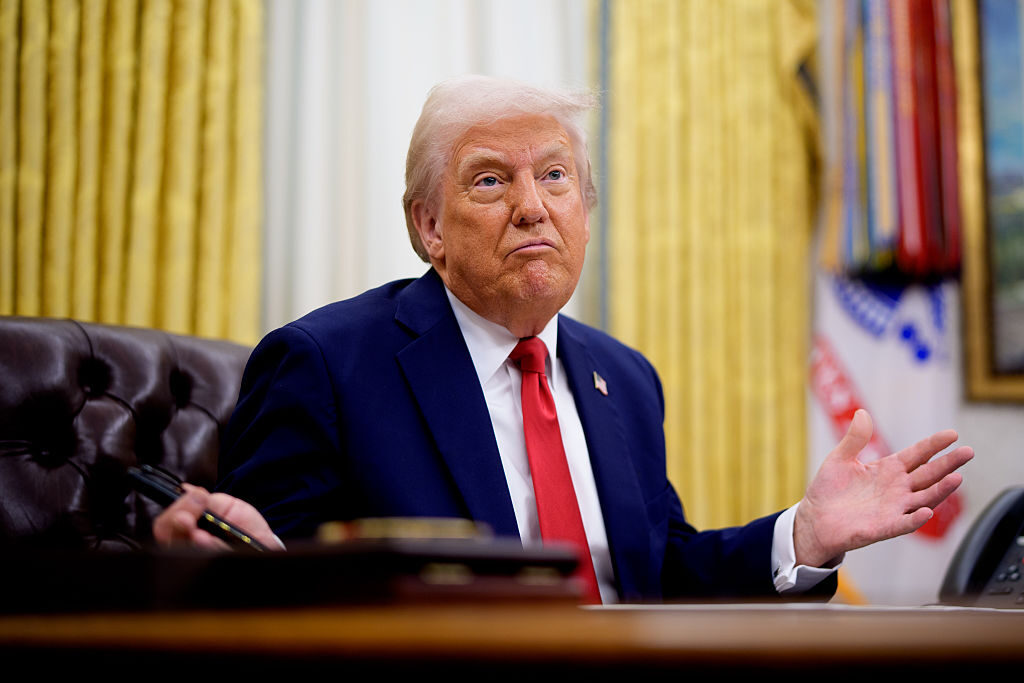Since President Donald Trump unveiled his tariff regime last Thursday, the world has been treated to a deluge of economic analysis, unequalled in recent memory either in quantity or self-assuredness. That’s understandable. It’s not every day that the world’s leading national evangelist for free trade packs up 50 years of free-trade lobbying and decides to become the world’s leading proponent of protectionism instead.
But most of our self-assuredness is misplaced. Beyond a few weeks’ tumble on the stock market, and some near-term contraction in growth and trade, it’s hard to know what comes next. We don’t know who will retaliate, by how much, and which countries Trump will offer deals or exemptions to.
One thing we know for sure is that, in the words of the Wall Street Journal’s editorial board: “Trump owns the economy now.” Only two-and-a-half months into his presidency, by making an economic decision more impactful than anything Joe Biden ever did, Trump has voluntarily given up that most coveted shield in any president’s armory: deflecting blame onto the previous administration.
There are those in America who seem to hope that Congressional Republicans will be lining up immediately to stop the tariffs. This is a fantasy, considering that the use of tariffs to revitalize American manufacturing was a leading plank in the platform that ushered the Republicans into power in November. Furthermore, for a still-mostly-conservative Republican Congress weaned on Milton Friedman, the fact that the sudden imposition of massive tariffs would trigger immediate global panic cannot have come as a surprise. The rest of the world’s shock notwithstanding, this is a deal Republicans knew they were making when they offered Trump their endorsements last year.
Even more ludicrous is the idea that the President will simply change his mind about the tariffs in the face of global financial panic. As Trump has shown over the years, he has no problem reversing himself, but he only does so when he believes he can convincingly salvage a win. That possibility does not exist in this case. There is no doubt that he will lower many of the tariffs he imposed last Thursday as he negotiates with nations willing to come to him hat-in-hand. But the massive offensive he orchestrated last week, affixed with the moniker “Liberation Day”, was meant to show that there is no going back.
But whether the tariffs will last long enough for the administration to realize its ambitions is another question. That will likely be determined by what happens economically — in world markets, in inflation, in employment — between the months of June (when the current financial tempest will have settled) and October.
Around the end of the year, as Republicans in Congress begin contemplating their 2026 midterm election prospects, they will have to make a judgment call. They know that the Constitution vests Congress with the power to levy taxes, including tariffs. They know that they voluntarily delegated that authority to the president in the 1977 International Emergency Economic Powers Act (IEEPA), and that they can also take it away. Should the economy slip into recession, Republicans in Congress may make common cause with Democrats and pass legislation to undo the tariffs. Given that most Republicans are free-traders, such measures could plausibly receive two-thirds veto-proof support in both the House and Senate. In order for this strategy to work, approval of Trump’s handling of the economy (including among his base) would have to be so bad as to make it politically palatable to rein him in.
Many Congressional Republicans may even feel that by limiting Trump’s power to introduce tariffs, they would be doing him and the country a favor. Trump has been a more effective promoter of the conservative agenda than any president since Ronald Reagan, but for that one bugaboo of protectionism. By hamstringing his ability to impose tariffs, they would be making Trump into the perfect conservative president — allowing him to combat the federal bureaucracy, secure the border, and pursue an America First foreign policy without running afoul of the conservative totem of free trade. Then they could market themselves to voters pragmatic Republicans who stepped in to set limits when necessary, while leaving the best of Trump untouched.
Democrats, however, might not play ball. “You made your bed, now lie in it”, they might say. It is just such a Marie Antoinette ethical compass, after all, that booted them from power last year.










Join the discussion
Join like minded readers that support our journalism by becoming a paid subscriber
To join the discussion in the comments, become a paid subscriber.
Join like minded readers that support our journalism, read unlimited articles and enjoy other subscriber-only benefits.
Subscribe